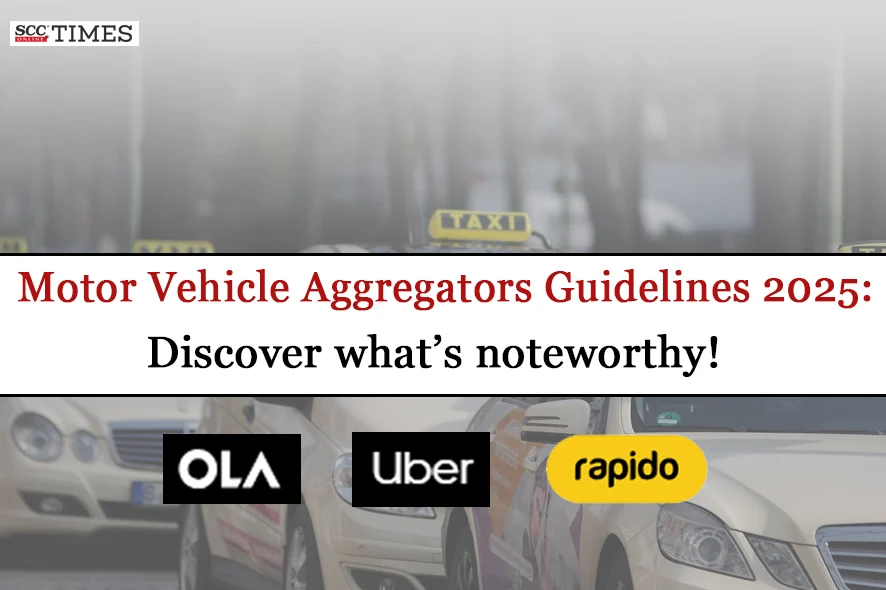On 1-7-2025, the Ministry of Road Transport and Highways announced the ‘Motor Vehicle Aggregator Guidelines, 2025’ to regulate the provisions regarding the digital aggregators revising the farmwork for licensing, vehicle and driver compliance, and promote electric mobility and inclusive transport. These guidelines ensure passenger, driver safety, fare transparency, and sustainability. All State Governments are advised to adopt these revised guidelines before 01-10-25.
Key Points:
- Section 88 of the Motor Vehicles Act, 1988 lays the foundation of the Motor Vehicle Aggregator Guidelines, empowering states to regulate aggregators through licensing and compliance norms.
- These guidelines are extended to all the aggregators in each State, excluding public travel service portals and interoperable networks that do not onboard drivers or vehicles.
- In this initiative, Centre will develop a ‘Designated portal’ providing single-window clearance for aggregators licences. This portal will also handle application fees, license fees, and security deposits.
- All the licence issued to these aggregators will be operated through these designated portals, deciding the applications within 90 days. The Competent authorities are advised to issue the licenses after due application and payment of ₹ 500000, within 15 days, and reject those that do not meet the required criterions.
- These licenses will be valid up to 5 years which can be renewed after reviewing the performance history of the aggregator and after a due payment of ₹ 25000.
- Through this guideline Aggregators are obligated to provide:
- 40-hour induction training to all drivers.
- Comply with health and public safety guidelines issued by Central/State Governments.
- Offer passenger insurance of at least ₹5,00,000 per trip.
- Allow drivers to work with multiple platforms without exclusivity restrictions
- Ministry has guided the aggregators to develop the features of the ‘app’ that is suitable for both drivers and passengers, like promoting transparency through ratings, etc.
- Grievance Officer is to be appointed by Aggregators responsible for resolving complaints and reporting them to the Competent Authority via an online system.
- Driver onboarding to meet the experience criteria under Section 7(1) of the Motor Vehicles Act and ensure verification of:
- Valid identity proof
- Valid driving licences
- Bank account
- Medically fit
- Passed a psychological assessment
- Not committed an offence under laws or convicted within 3 years
- Guidelines also ensures that various benefits to the onboarded drivers which the aggregators are needed to provide-
- Minimum coverage of ₹500000, as per provisions of Social Security Code, 2020
- Mandatory Quarterly training for low-rated drivers
- A Complaint inquiry protocol, to be completed within 3 days
- Aggregators will ensure that all vehicles operated by onboarded drivers possess a valid permit under the Motor Vehicles Act, 1988 and applicable rules.
- Vehicles are to be equipped with Vehicle Location Tracking Device (VLTD) compliant with AIS 140 standards.
- Child Lock mechanism is prohibited to be used to enhance passenger safety, especially in aggregators contexts where misuse of child locks has raised concerns.
- The guidelines also stress the importance of app integrity and accessibility where Aggregator apps are needed to be multilingual and be certified by a cyber-security firm recognized by CERT-In, displaying fare breakdowns, allow live location sharing during journeys.
- Motor Vehicle Aggregators are also required to maintain compatibility for passengers with disabilities ‘Divyangjan’. States are advised to determine appropriate quotas for Divyangjan-friendly vehicles.
- Fare structures are regulated to include a base fare set by the state for a minimum of three kilometres to cover dead mileage which also them to charge fares within a dynamic range, no less than 50% and no more than twice the base fare. For aggregator-owned vehicles, the driver’s share is decided at least 60%, remaining share for the aggregator.
- Cancellations fee is capped at ₹100, exercised by either the driver or the passenger, provided the cancellation lacks a valid reason.
- In support of sustainability, the guidelines encourage State Governments to impose annual targets for the inclusion of electric, zero-emission, or alternate fuel vehicles in aggregator fleets.
- The Ministry has advised State Governments to exercise oversight powers, which include requesting documentation, conducting inquiries, and verifying vehicle and driver data through portals such as VAHAN and SARTHI.


